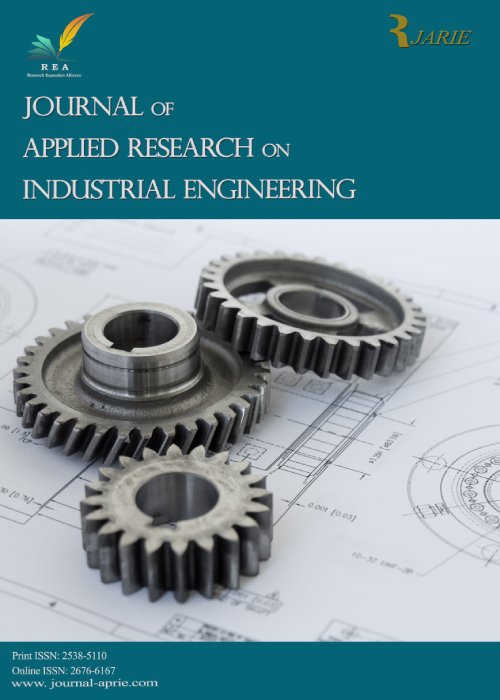فهرست مطالب
Journal of Applied Research on Industrial Engineering
Volume:3 Issue: 1, Autumn 2016
- تاریخ انتشار: 1395/08/25
- تعداد عناوین: 5
-
Pages 1-14In todays knowledge-based economy, intellectual capital has been used for organizations. Knowledge has been replaced with other capitals as the most important capital. The role of man power is notable as an effective factor and the most important capital. Also, organizational commitment has a considerable effect on the improvement of organization effectiveness and many variables. On the other hand, the function of organizations should be investigated for the purpose of maintaining their survival. Data enveloping analysis is one of the techniques which is used in this field. The aim of this study is to evaluate the function of organizational units based on the intellectual capital and organizational commitment with the use of DEA. In this study, units of operation, warehouse, design and manufacturing, production planning, quality assurance and education, laboratory and law enforcement became efficient and their efficiency ranks were identified with the use of AP method. Units of design and manufacturing, production and planning, quality assurance and education, operation, and laboratory were respectively ranked from first to fifth place and the rank of warehouse and law enforcement units were not identified. Also, the intensity of input effects on the organizational commitment was included customer capital, structural capital, and human capital.Keywords: intellectual capital, Organizational commitment, Performance evaluation, Data envelopment analysis
-
Pages 15-29Today the reverse logistics is one of the major activities of supply chain management that include all physical activities associated with returned products (e.g, sets, recovery and recycling, disposal and demolition). In this regard, concern about the environmental impacts of business activities lead to interest in supply chain design that is environmentally friendly. This article takes into consideration to minimize the environmental impact beside minimize the total cost of the basic model and the inherent uncertainty of input data. The basic model is considered to be a model plan to design a reverse logistics as a part of the supply chain in order to minimize the total cost for recycling urban solid waste. In dealing with uncertainty a scenario-based approach is used and the proposed model has been solved using GAMS software.Keywords: Recycling, urban solid waste management, green reverse logistics network design
-
Pages 30-38One of the main problems in production process of composite curly sheet process is long time duration of impregnability of needle mat to resin operation and high costs of this operation. Increased time of impregnability operation in production process caused the occurrence of ravine and consequently the output amount of production line is dramatically reduced. Removing ravine or reducing its time, has direct effect on production increase therefore the cost price of final product will decrease too. In this article first by using design of experiment technique, the effective factors on reducing operation time in production process are identified, in next stage, appropriate functions for variables of time respond and direct cost of impregnability operation was processed as separated on each agent level. Then, using multiple objective design making techniques, optimum levels of each factor for each formed model was determined and finally, the best achieved answer from processed models is chosen as optimum final answer. Model sensitiveness toward changes in importance degree of each of the aims is also analyzed and studied in comparison with each other.Keywords: Design of experiments, Multiple Objective Decision Making (MODM), Response surface methodology (RSM), Methodology of Needle Mat, Resin, Impregnability
-
Pages 39-48Today, the rapid increase of the industrial activities and uncontrolled consumption of natural resources cause environmental problems and interested companies in the activities that support sustainable environment. The primary concerns of reverse logistics are waste management, material recovery, part recovery and product recovery. This paper aims to prioritize critical success factors of reverse logistics in HAMGAM KHODRO ASIA. The results were obtained through a questionnaire from the top-level managers and engineers that work in HAMGAM KHODRO ASIA. Results of case study show that critical success factors of expert and trained personnel, customer satisfaction, flexibility of system, financial advocate of managers and flexibility of management are the strength point of company. Weak points of this case study are environmental awareness, environmental issue, reduction in overall production cost, regularity issue and use of existing personnel.Keywords: Reverse Logistics, Critical Success Factors of reverse logistics, HAMGAM KHODRO ASIA
-
Pages 49-57One of the most important issues in modern societies is to provide better services and evaluation of provided services. Service organizations are always looking to increase their level of customer satisfaction. In this context, Service quality and service quality gaps analysis are taken into account. In this paper a method developed for ranking service organization based on the services quality approach and multi attribute decision making tools. In this method, options are organizations and the indicators are service quality gaps. However, other than gaps the perception of service quality is considered as a separate indicator. The weight of indicators are calculated by paired comparisons tools and experts panel results. Linear assignment method is used to rank the options. The developed method is used to rank seven hotels in city of Isfahan. The results show that the implemented method ranked the Abbasi hotel as first and Kosar hotel as last in the ranking.Keywords: Service quality, Hotel, Linear assignment, Ranking, MADM


